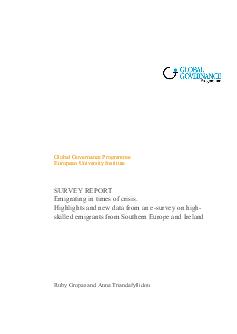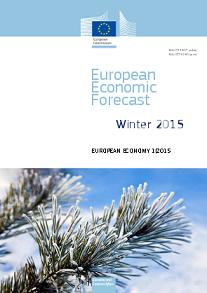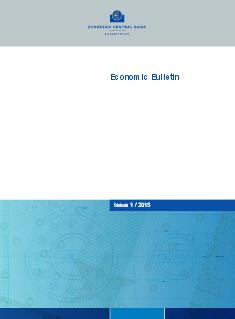Crook, O. (2015) “The ECB Should Stay Out of Politics“, BloombergView, 10 February. Has the European Central Bank made itself the judge of which countries remain members of the euro area? That would be an amazing assertion of power — on the face of it, completely at odds with its usual insistence that it stands outside politics. Yet that is more or less what the ECB seemed to do …Read More
Survey Report: Emigrating in times of crisis. Highlights and new data from an e-survey on high-skilled emigrants from Southern Europe and Ireland
Gropas, R. & Triandafyllidou, A. (2015) Survey Report: Emigrating in times of crisis. Highlights and new data from an e-survey on high-skilled emigrants from Southern Europe and Ireland, Global Governance Programme – European University Institute, February. The issues at stake Crises impact on migration trends and development in numerous ways. In general, remittances tend to fall and ‘brain drain’ tends to increase as high skilled individuals are prone to …Read More
European Economic Forecast: Winter 2015
European Commission (2015) European Economic Forecast: Winter 2015, European Economy 1|2015, DG for Economic & Financial Affairs, February. GDP growth in the EU remains sluggish. Sputtering investment has so far prevented a broader and more robust acceleration of domestic demand. Amid challenging global conditions, the fall in crude oil prices should provide a welcome boost to growth. Several important shifts are under way in the global economy. Falling oil …Read More
Update on Economic and Monetary Developments, Economic Bulletin Issue 1/2015
ECB (2015) Update on Economic and Monetary Developments, Economic Bulletin Issue 1/2015, European Central Bank, February. Summary The recent decline in oil prices is supporting the global economic recovery. Nevertheless, the recovery remains gradual and economic developments vary across regions. Growth in the United States remains robust, momentum is slowing in China, and activity in Japan has not regained traction. Economic conditions in Russia have deteriorated further, but spillovers …Read More
Greece: ECB Kicks Syriza in the Face; Syriza Turns the Other Cheek
Weisbrot, M. (2015) “Greece: ECB Kicks Syriza in the Face; Syriza Turns the Other Cheek“, The Huffington Post, 05 February. On Wednesday the European Central Bank (ECB) announced that it would no longer accept Greek government bonds and government-guaranteed debt as collateral. Although Greece would still be eligible for other, emergency lending from the Central Bank, the immediate effect of the announcement was to raise Greek borrowing costs and …Read More
Je suis Dijsselbloem ou Varoufakis?
Χατζησταύρου, Φ. (2015) “Je suis Dijsselbloem ou Varoufakis?“, Protagon Website, 04 February. Η πρώτη συνάντηση Βαρουφάκη-Ντάισελμπλουμ φέρνει στη δημόσια συζήτηση ένα θέμα που μέχρι τώρα ήταν αντικείμενο ανάλυσης κυρίως των ενασχολούντων με τη θεσμική λειτουργία της ΕΕ στα οικονομικά θέματα. Ευκαιρία, λοιπόν, να δούμε ποιο είναι το πρόβλημα, γιατί υπάρχει πρόβλημα, και ποιες οι συνέπειές του μέχρι σήμερα. Από το 2010 και μετά οι ευρωπαϊκές κυβερνήσεις ομόφωνα προχώρησαν στην …Read More
We Need An Industrial And Innovation Policy For Europe
Pini, P. & Antonioli, D. (2015) “We Need An Industrial And Innovation Policy For Europe“, Social Europe Journal, 30 January. The prolonged economic crisis since 2008 has drastically reduced incomes and employment levels and the promised recovery will not reabsorb unemployment, particularly in Europe. Nevertheless, economic policy in Europe is sticking to past recipes based on two mainstays: fiscal austerity and labour flexibility. This strategy does increase the short-run …Read More
Why did Britain join the EU? A new insight from economic history
Campos, F. N. & Coricelli, F. (2015) “Why did Britain join the EU? A new insight from economic history“, VoxEU Organisation, 03 February. Britain eschewed EU membership in the late 1950s but changed its mind in the early 1960s, only to be rebuffed by Charles de Gaulle. Membership came only in the early 1970s. This column argues that, among others, Britain joined the EU as a way to avoid …Read More
There has been a substantial drop in EU legislative output since 2010
Dehousse, R. & Rozenberg, O. (2015) “There has been a substantial drop in EU legislative output since 2010“, LSE EUROPP, 03 February. A common argument made against the European Union by Eurosceptic politicians is that the EU creates a burden on citizens and businesses by producing too much legislation. But how much legislation does the EU actually produce? Renaud Dehousse and Olivier Rozenberg present data on both the raw …Read More
Who’s Unreasonable Now?
Krugman, P. (2015) “Who’s Unreasonable Now?“, The New York Times, 02 February. OK, so as I understand the latest from the new Greek government, Yanis Varoufakis is saying that he and his colleagues don’t care what happens to the headline value of the debt — if you want to claim that there has been no write-off, OK. What they want instead is substantive but not outrageous relief from the …Read More












